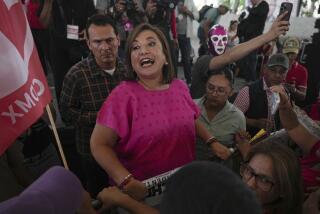Hands Off
- Share via
Several members of Congress who remember vividly the irrational zeal with which the Reagan Administration tried to oust Nicaragua’s Sandinista regime are pushing for a law to prohibit covert U.S. involvement in that country’s elections next year. While President Bush has dealt with Nicaragua more calmly and reasonably than Reagan did, such a law is a good idea.
The United States has grown so accustomed to bcalling most of the shots for the Nicaraguan opposition, especially the Contras, that some U.S. officials may well be tempted to do the same during the electoral campaign leading up to the February voting. The former Contra paymasters in the Central Intelligence Agency, for example, are pressuring Contra leaders living in Miami to return to Nicaragua before the voting and meeting some resistance from those who prefer comfortable exile in Miami. It is possible that the CIA may want to intervene in the election if divisions among opposition parties make an easy Sandanista victory likely. There are more than 20 political parties campaigning against the Sandinistas, ranging from the far right to far left of the ruling party. Fourteen of those parties have pledged to work together in a united opposition bloc, but so far there is only scant evidence they will work together effectively.
Covert U.S. aid has been flowing to anti-Sandinista groups, quite apart from the Contras, for several years. Some reportedly has gone to labor unions, private business groups, the Roman Catholic Church and the opposition press. At first glance, continuing or expanding such aid may not seem a radical change in policy. But it will be doubly risky during a closely monitored election.
If the covert aid becomes public, as it probably would be given the history of such efforts, recipients of the aid would be discredited in the eyes of other Nicaraguans and branded by the Sandinistas as disloyal agents of the Colossus of the North. Worse, if the opposition were on the verge of victory when such aid was discovered, it would provide a perfect excuse for Sandinista hard-liners to halt the election process rather than risk defeat.
And some defeats for the Sandinistas are likely in the voting. Nicaragua’s people are weary of the violence and turmoil they have endured since the Somoza dictatorship was overthrown 10 years ago, and they are particularly disillusioned with the mess the revolutionary government has made of their nation’s economy. Many will express their frustration at the polls. But if the opposition is unable to get its act together well enough to take full advantage of this opportunity, it would be the height of arrogance for U.S. officials to think covert aid could somehow tip the balance against the government.
Existing U.S. law already provides for aid to be given openly to the electoral process in Nicaragua, and Congress has allocated $5 million for that purpose. If there is a need for any more aid, let it also be given publicly. But when Congress votes on the 1990 Intelligence Authorizations Bill in the next few weeks, it should amend it to bar the CIA and all other U.S. government agencies from spending money on covert election activities in Nicaragua.
More to Read
Sign up for Essential California
The most important California stories and recommendations in your inbox every morning.
You may occasionally receive promotional content from the Los Angeles Times.













